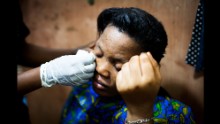 Living in Uganda in 2013, German photographer Anne Ackermann couldn't ignore the sight of light-skinned women with obviously dark feet, elbows and joints.
Living in Uganda in 2013, German photographer Anne Ackermann couldn't ignore the sight of light-skinned women with obviously dark feet, elbows and joints.
As
someone who regularly documents issues surrounding beauty, identity and
womanhood, Ackermann's natural curiosity led her to Mama Lususu.
Mama
Lususu, which translates to the "mother of beautiful skin," owns
popular beauty parlors across downtown Kampala and is famous for helping
women to bleach and lighten their skin tone. She also helps to repair
skin damaged by the improper use of bleaching chemicals or even stain
removers at home.
Skin lightening, a
common practice in Uganda, is something that few women will admit to
even though they were willing to be photographed by Ackermann in
Lususu's parlor. Some of Ackermann's subjects even tried to tell her
they were born with lighter skin.
"There
seems to be a strong desire for browner or fairer skin," Ackermann
said. "Yet at the same time, there is shame and secrecy to it."
The
ideal skin tone in Uganda appears to be caramel, Ackermann said. One
client told her "brown women shine brighter in the dark night." Women
are willing to apply harsh chemicals and carcinogens to lighten their
skin, which surprised Ackermann because the process is also so harmful.
"I
am learning that there seems to be a serious pressure for women to fit
into dominant beauty stereotypes in a society based on the belief that
the fairer and lighter is associated with beauty and wealth," she said.
Besides
photographs for her ongoing series, the experience at Lususu's has also
afforded Ackermann with new memories and a unique perspective of
Kampala.
"Just hanging out around the
tiny wooden cabins in Mama Lususu's parlor in the hustle and bustle of
downtown Kampala -- the air heavy with chemicals, watching and chatting
to the women that showed up there from all walks of life -- was a great
experience after trying to gain access for so long," she said.
Social media
Follow to join the conversation about photography.
Follow to join the conversation about photography.
Ackermann
says her project is far from over, and she wants to keep documenting
this process while broadening the scope to include other issues of
beauty and identity. She has also started another series on beauty and
plastic surgery, which is new to the region.
Ackermann
has previously documented body and identity issues. Her 2009 series
"Plástica" followed women after plastic surgery in Brazil.
She
is now on a quest to find other projects that portray surprising and
positive stories in Uganda. And she hopes her images will cause people
to reflect on the undertones of identity.
"I
think it's all about raising a question rather than finding all the
answers," she said. "If I can make people pause their everyday routine
for a moment, look at the images, stop and wonder, I think that's a
lot."

Comments
Post a Comment